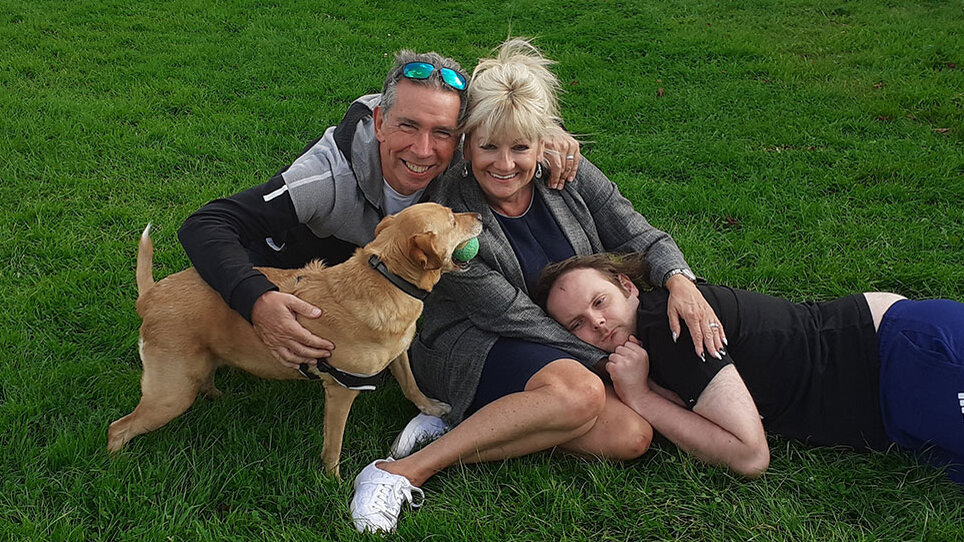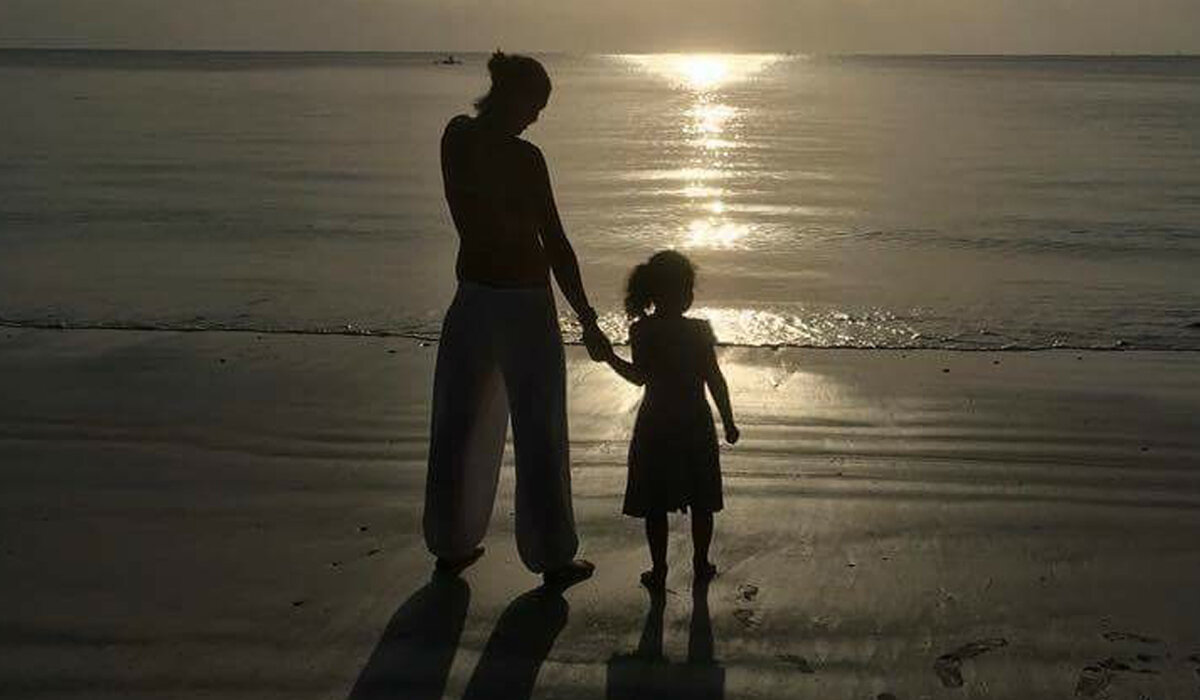
"Our aim was to get Ryan and other autistic people out of hospitals and into the community."
Sharon Clarke
- on mental health hospitals and advocating for her son, Ryan
Stories from the Spectrum: Sharon and Ryan
In May 2011, BBC Panorama released a documentary on the mistreatment of residents at Winterbourne View – a mental health hospital for autistic adults and people with a learning disability. The documentary captured deeply upsetting scenes of support workers and nurses abusing residents. This sparked an investigation into Winterbourne View, and several staff members were sent to prison.
It also led to the Government’s Transforming Care proposals, designed to move people out of inpatient mental health hospitals. But, ten years on, too many autistic people are still stuck in these hospitals. As a charity, we are working hard to make sure that autistic people receive the care and support they need and we want to highlight this ongoing scandal.
We will be regularly publishing information about how many autistic people remain in these hospitals and what this means for the people involved. With this in mind, we caught up with Sharon Clarke. Sharon's son, Ryan, is autistic with high support needs. Here, Sharon spoke to us about Ryan's experience of being detained in mental health hospitals, campaigning for change, and how she and Ryan found hope in times of difficulty.
When was Ryan diagnosed as autistic and what made you seek a diagnosis for him?
Ryan was diagnosed in February 2018 by his psychiatrist at the hospital. He wasn’t responding to anything at the time and was in seclusion for four and a half months. During this time, I could phone the hospital, but I wasn’t able to see or speak to Ryan.
Ryan had been previously diagnosed with schizophrenia. His psychiatrist then suggested that he may be autistic. The psychiatrist also told me that he’d never thought Ryan had schizophrenia, and that it was a misdiagnosis.
How does being autistic impact Ryan?
Ryan is a wonderful person. He’s very kind, affectionate, and caring. He does have meltdowns, but he can’t help it.
He’s got a very good memory. He remembers a lot from his younger days. Also, if he sees somebody once, he knows them. I wish I had that memory! Ryan faces a lot of challenges day to day. He has a lot of mood changes. He can be ok one moment, and in the next minute he’s having a meltdown.
He’s slow to process information. When he’s been for a day out, he enjoys himself in the moment, but struggles to adjust when he goes back to the hospital. He finds it difficult to process sensory information, especially when he’s around a lot of people.
Ryan also finds routine changes difficult. He goes out every day in the garden at 2pm, and it can’t be too much later than that. He’s also got a very poor sleep pattern and sometimes goes days without sleeping. I reckon there is a lot of noise in psychiatric hospitals, which probably doesn’t help with this.
When did Ryan first go into the forensic psychiatric hospital?
He went into hospital in 2006. He was in open psychiatric units for four years.
He went into the forensic hospital in 2012. A forensic psychiatric is to treat offenders and people with distressed behaviour. Ryan has distressed behaviour, but he has never committed a crime. There’s such a difference between the two. I think psychiatric forensic hospitals should only exist for offenders who are mentally ill.
What has Ryan's experience in the hospital been like?
He’s had a terrible experience to be honest. He’s been subjected to over-medication, seclusion, restraint and broken bones, no family time and restrictive leave.
The staff have had no understanding of autism until recently. Things have really improved over the past eight months and his current RC (Responsible Clinician), nurse and core team look after him really well.
I do wonder whether things would’ve improved, had I not gone on TV and campaigned for autism awareness as much as I did.
How has this experience impacted you and your family?
I am remarried, and my husband Peter is a godsend to Ryan. Ryan really thinks a lot of him.
Ryan also has two older sisters. He doesn’t see them a lot, but they’re always asking about him. I think they’re a bit frightened of psychiatric hospitals - perhaps due to the stigma.
You've done a lot of campaign work around Transforming Care. Could you talk a bit more about that?
It has been a constant battle for me to advocate for Ryan. I’ve appeared on Sky News, local news, in the Daily Mail, the i, and the Independent (among others), campaigning to help Ryan and those like him. People don’t really know what goes on in psychiatric hospitals, and I think if they did there would be riots!
My aim was to get Ryan and other autistic people out of hospitals and into the community. Hospitals are too cold and clinical – you've got a set time for everything.
Ryan has got a diagnosis of psychosis, as well as autism - although I personally think he is just autistic. However, I think hospitals breed psychosis anyway. You become institutionalised.
"My aim was to get Ryan and other autistic people out of hospitals and into the community. Hospitals are too cold and clinical – you've got a set time for everything."

How can mental health services help create a better world for autistic people?
I don’t think autistic people should be put in ATUs (assessment and treatment units – another name for some inpatient mental health hospitals) or forensic services. Autistic people should be cared for in the community. That should just be the norm.
I would love people to understand that autistic people are just people who think differently. I just can’t understand why there isn’t more information about autism, learning disabilities, and mental health conditions in the media. It needs to be publicised more.
"I would love people to understand that autistic people are just people who think differently."
We were pleased to hear that Ryan may soon be moving out of the hospital. Do you know what his next steps will be once he's moved out?
Ryan will be moving into his own house, where he’ll have full-time care from Sugarman Health staff (who provide supported living care for adults). Because he’ll be supported in the community, I am involved – it's a really good system. The carers have been recommended to me. I’ll read their CVs and interview them, and see whether they’re ok for Ryan or not.
Ryan is hoping to move out in September or October this year. He’ll be a part of the community, with some restrictions on where he can go or what he can do to keep him safe, under a DoLS (Deprivation of Liberty Safeguard). Activities will be planned for him – family visits, country walks etc.
He may even be given a dog (trained specifically for autistic people). His garden leads out into the countryside, so it’s excellent for dog walking! Ryan loves animals and he loves the country. As soon as I saw the house, I thought, ‘Ryan, definitely!’. It’s been an uphill battle but we’ve got there in the end!
Our latest data on mental health hospitals
Read our news story on the number of autistic people still in mental health hospitals, and how we’re working to change this through our Autism Inpatient Mental Health Casework Service.

Similar stories

"Rarely an hour goes by that I don't think about what happened in hospital."
Alexis Quinn
- on her experience of being in a mental health hospital
Read more
Get advice and support

The Spectrum magazine
Explore one of the UK's largest collections of autistic art, poetry, and prose. The Spectrum magazine is created by and for autistic people, and is available both online and in print.
Read the Spectrum





You are not alone
Join the community
Our online community is a place for autistic people and their families to meet like-minded people and share their experiences.
Join today

